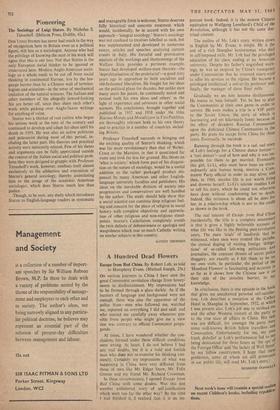A Hundred Dead Flowers
ON various journeys to China I have seen the great Communist revolution change from honey: moon to disillusionment. My impressions had to be formed through a glass darkly. As if the barriers of language and background were not enough, there was also the apparatus of the police State—men who followed me, watched me, reported on everything I did and said; and who steered me carefully away whenever pos- sible from people who might give me a view that was contrary to official Communist propa- ganda.
At times, I have wondered whether the con- clusions formed under these difficult conditions were wrong. At heart, I do not believe I had any real doubts, but it is a bold and foolish man who does not re-examine his thinking con- stantly. Certainly my impressions of what was happening in China were very different from those of men like Mr. Edgar Snow, Mr. Felix Greene and my friend Mr. Richard Crossman.
In these circumstances, I opened Escape from Red China with some doubts. Was this just another embittered story of self-justification which went too far the other way? By the time I had finished it, I realised that it is an im- portant book. Indeed, it is the nearest Chinese equivalent to Wolfgang Leonhard's Child of the Revolution, although it has not the same doc- trinal content.
The outline of Mr. Loh's story, written down in English by Mr. Evans, is simple. He is the son of a rich Shanghai businessman who died in self-imposed exile. Mr. Loh had the privileged education of his class, ending at an AMerican university. Despite his father's anguished warn- ings, he was so inspired by China's resurgence under Communism that he returned starry-eyed to offer his services to the regime. He became a privileged intellectual, a university professor and. finally, the manager of three flour mills
Gradually we see him become disillusioned. He learns to hate himself. Yet he has to play the Communists at their own game in order to survive. He even makes a trip in a VIP party to the Soviet Union. the story of which Is fascinating and yet hilariously funny because of the effect of decadent Russian Communism upon the dedicated Chinese Communists in the party. He plans his escape from China for three years. Eventually, he succeeds Running through the book is a sad, sad story of Loh's feelings for a Chinese dame hostess— a 'taxi dancer'—and of how and why it was in1- possible for them to get married. Eventually this girl, Li-Li, who must have been an extra- ordinarily nice human being, marries a Com- munist Party official in order to stay alive; and then, in 1960, decides life is not worth living and drowns herself. Li-Li's suicide enables Loh to tell his story, which he could not otherwise have done without condemning her to death. Indeed, this reticence is about all he does for her, in a relationship which is not to his credit as shown in the book.
The real interest of Escape from Red China (incidentally, the title is a complete misnomer) is that it gives a highly believable account of what life was like in the fleeting post-revolution years. The mass 'trials' of landlords that he witnessed, when men were treated like pariahs, the cynical duping of visiting foreign 'delega- tions' of so-called left-wing politicians and journalists, the constant threats of secret police thuggery, are exactly as I felt them to be on my own visits. In particular, the period of the `Hundred Flowers' is fascinating and accurate in so far as it shows how the Chinese saw it on their side of the invisible barrier, to my knowledge.
In conclusion, there is one episode in the boa that gives me unashamed personal self-satisfac- tion. Loh describes a reception at the Catha.Y Hotel in Shanghai in September, 1952, at which I was present also. Loh's job was to mislead rile and the other Western visitors at the party as to the true state of affairs in China. His task was not difficult, for amongst the party were, some well-known British fellow travellers and Communists. Unfortunately for me, my ovin frank disbelief at Loh's performance led to Ine being denounced for three hours as 'the spy of the Foreign Office' and 'the lackey of Wall Street by my fellow countrymen. I hope that these, gentlemen, some of whom are still prominent in our public life, will read Mr. Loh's story!
DESMOND DONNELLY


































 Previous page
Previous page